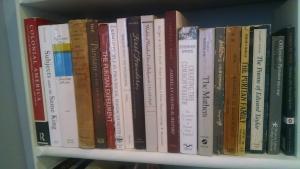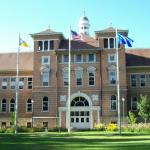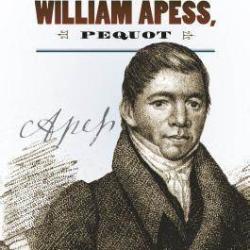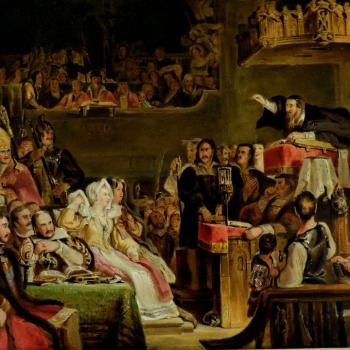 Marilynne Robinson, writer of beautiful novels and perspicacious essays, turns some attention to New England Puritans in an American Scholar article drawn from her most recent book, What Are We Doing Here? She characterizes Puritans as progressive contenders for a society shaped by grace rather than harsh punishment.
Marilynne Robinson, writer of beautiful novels and perspicacious essays, turns some attention to New England Puritans in an American Scholar article drawn from her most recent book, What Are We Doing Here? She characterizes Puritans as progressive contenders for a society shaped by grace rather than harsh punishment.
“What do we lose when we ignore early American history and, to the extent that we notice it, mischaracterize it? The stigmatizing word that makes the North fall out of sight is Puritanism…..In 1630, 12 years before the English Civil War began, John Winthrop famously called the colony he would help to establish at Massachusetts Bay a city on a hill whose success or failure would be known to the world. It would have the world’s attention because it would be a radical community, an experiment, created by covenant among members whose bonds were hoped to be mutual charity—that is, compassion and love.”
As the builders of the Massachusetts Bay Colony would attest themselves, they did hope to build a different kind of society, a good one that would serve as a model for subsequent colonies and also for England itself. Massachusetts governor John Winthrop, like others, used lyrical language to describe the aims of that colony. Winthrop exhorted the settlers to be “knit together, in this work, as one man,” to “abridge ourselves of our superfluities, for the supply of others’ necessities,” to “make others’ conditions our own; rejoice together, mourn together, labor and suffer together,” with love as the “bond of perfection.”
Robinson impugns the caricature of Puritans as starchy and merciless, regretting the way their portrayal in the literature that is often served up to high school students distorts this (about which I also have complained).
“Like Cathars and Cromwell, the American Puritans are assumed to have been particularly severe, but in an age when judicial mutilation was commonplace in England and Europe, and where capital crimes were innumerable and unpublished, evidence I have seen suggests that the Puritans were notably restrained….. Hawthorne’s novel [The Scarlet Letter] has served as evidence of an appalling severity, when in historical context it would have been no such thing. The Crucible is about the McCarthy era, of course, but it is taught as a phenomenon that captures the essence of American Puritanism….yet these two works of fiction lie like a glacier on the history of America’s radical and progressive history….”
The vision of New England Puritans as exemplars of traits some Americans would name best about us and our experiment, the vision of Puritans as our first founders, has been given its due in the writing of U.S. history. Launching a tide of sophisticated and nuanced scholarship on New England settlers about a century ago, Perry Miller was struck by an insight, while watching oil drums being unloaded on the banks of the Congo, that the “innermost propulsion of the United States” somehow proceeded from the Puritan migration.
To be sure, a case also can be made against seeing New England Puritans as progressive, when attention is given to other kinds of evidence: to their often execrable dealings with Native Americans, to their persecution of other religious groups, to the strain inflicted by striving for holiness, to the violations of their own high principle in service of Mammon, including in the slave trade. As Cotton Mather reported of a fisherman from Marblehead, Massachusetts, who sassed a pious preacher, “You think you are talking to the people of the Bay,” the man said, but “we came here to catch fish.”
I would be the first to agree that we all lose out when we ignore early American history. But Robinson is on shakier ground when she impugns the historical profession for neglecting to tell this story. Sure enough, plenty of argument surrounds study of the settlement of the English colonies in seventeenth and eighteenth centuries, northern and southern. Reasonably enough, there is plenty of disagreement in interpretation of New Englanders’ errand into the wilderness. But it is just not true that they have been neglected, nor that all treatment has been unflattering or unfair. Robinson charges:
“This country is in a state of bewilderment that cries out for good history. How are we to account for liberating thoughts and movements, things that have gone well? What has been the thinking behind our great institutions? I have found little help in answering these questions. I hope for a day when I can immure myself in some fine archive and explore them in depth. Early American historiography is for the most part a toxic compound of cynicism and cliché, so false that it falsifies by implication the history of the Western world.
Cry no more, beloved and bewildered country. There are long shelves and tall stacks of books worth reading that give New England’s settlers their due. To be sure, the charms of a fine archive are many, though study of this peculiar people hardly requires immuring, as published documents circulate widely. It was after all a point of principle (if not to say pride) that Puritans established a printing press in Cambridge, Massachusetts, within their first decade of settlement. Books abound by and about magistrates and ministers, clergy and laity, poets and prophets, as they do for those who take religious liberty and radicalism even further, like the Baptists and Quakers of those northeastern colonies.
Ms. Robinson, you’re in for a treat.













